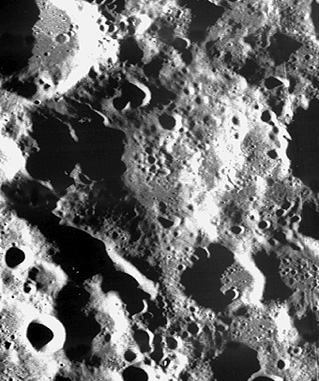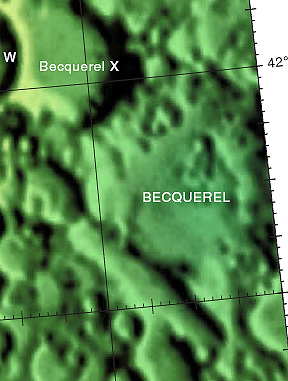Becquerel
Contents
Becquerel
| Lat: 40.7°N, Long: 129.7°E, Diam: 65 km, Depth: km, Rükl: (farside) |


(Left) Annotated image from Apollo Footprint Viewer. (Right) Color-coded LAC 30 from USGS Digital Atlas
Images
LPOD Photo Gallery Lunar Orbiter Images Apollo Images
- Note: Becquerel can be found in Lunar Orbiter Map LAC 30 of the USGS Digital Atlas, however, as this LAC is currently under construction (as of 4 June 2009 at time of writing), updates should be checked for.
Maps
(LAC zone 30B3) USGS Digital Atlas PDF
Description
Becquerel by its worn-down appearance is a very old crater. It's rough-looking floor includes several small craters of various sizes (largest ~ 10 km across), while most of its inner rim has formed into two or three level platforms. Several chains of craters surround the region in which the crater lies, the most notable would be Catena Kurchatov some 100 km away in the south-east -- produced by the Humboltianum Basin in the north-west (~ 900 km away). An unusual trough lies just off the south-western rim of Becquerel, however, this may be the product of several craters of similar size coalescing together. - JohnMoore2
Description: Wikipedia
Additional Information
Nomenclature
Henri Becquerel (December 15, 1852 - August 25, 1908) was a French physicist, Nobel laureate, and one of the discoverers of radioactivity. He won the 1903 Nobel Prize in Physics for discovering radioactivity. In 1896, while investigating phosphorescence in uranium salts, Becquerel accidentally discovered radioactivity. Investigating the work of Wilhelm Conrad Röntgen, Becquerel wrapped a fluorescent mineral, potassium uranyl sulfate, in photographic plates and black material in preparation for an experiment requiring bright sunlight. However, prior to actually performing the experiment, Becquerel found that the photographic plates were fully exposed. This discovery led Becquerel to investigate the spontaneous emission of nuclear radiation. A crater on Mars and the SI unit for radioactivity, the becquerel (Bq), are named in his honor.
LPOD Articles
Bibliography